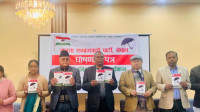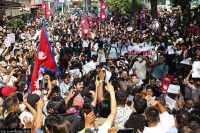National
President’s office defends Karki government formation
Written response to the Supreme Court claims the government formation was necessary to protect national unity and uphold the constitution.
Post Report
The Office of the President has submitted a written reply to the Supreme Court, defending the formation of the government led by former chief justice Sushila Karki and the dissolution of the House of Representatives.
The office also argued that 17 writ petitions under consideration in the apex court’s constitutional bench should be dismissed. It said that the constitutional responsibility to form a government arose on September 12 after the Gen Z protests, and the government led by Karki was formed out of unavoidable necessity.
The Supreme Court had issued a show cause notice to defendants, including the Office of the President, following preliminary hearings on the petitions. The apex court is scheduled to hear the cases on December 8.
The president’s office argued that there was no need to raise the issue of reinstating the House. “Raising the issue of reinstating the House of Representatives contradicts the country’s current constitutional needs, social and political essence, and sentiment, and the petitions are therefore liable for dismissal,” the written response states.
The reply refers to Articles 61 (3) and (4) of the constitution, noting the President’s duty to promote national unity and uphold the constitution. It states that due to the unusual circumstances caused by youth-led protests, then Prime Minister KP Sharma Oli resigned, leaving the prime minister’s post vacant. In such extraordinary circumstances, political party members in parliament were unable to take the lead in forming a government, the office said.
The office said the government was formed out of necessity to maintain peace, security, and administrative order, and because there was no time for normal discussions on claims or consultations.
The reply also states that the President formed a government to uphold the constitution, promote national unity, and assign responsibility for elections within six months, acting within constitutional powers and in consultation with political parties and stakeholders.
The decision was based on written recommendations from then Prime Minister Oli, considering the extraordinary situation, the office claimed.
Defending the move, the reply states that the action was taken in the larger interest of the country and people, to stabilise an abnormal situation when no other constitutional alternative existed. It adds that the dissolution of the House followed constitutional procedure, based on the urgent necessity arising from extraordinary circumstances, and aligns with the spirit and principles of the Constitution.
The written reply further asserts that actions taken under such complex and abnormal circumstances are justified under the principle of necessity. The steps taken were constitutionally appropriate in the absence of any other constitutional option, the office said in the written response.




 18.12°C Kathmandu
18.12°C Kathmandu














